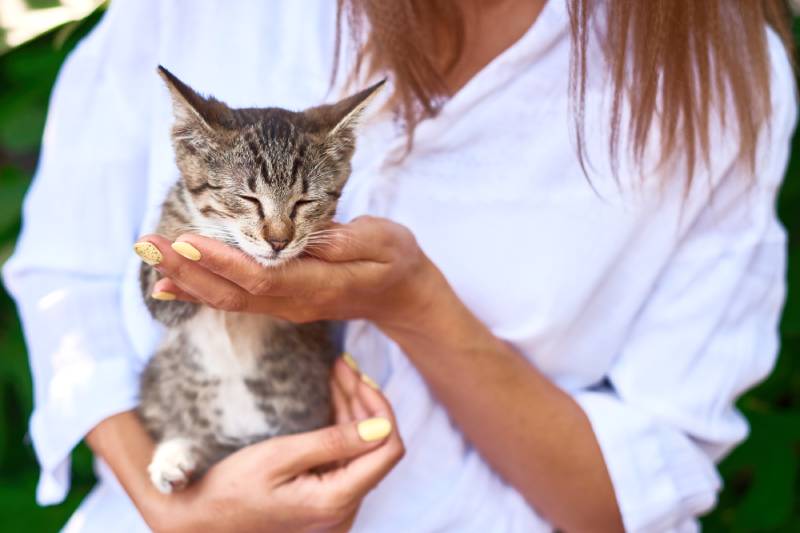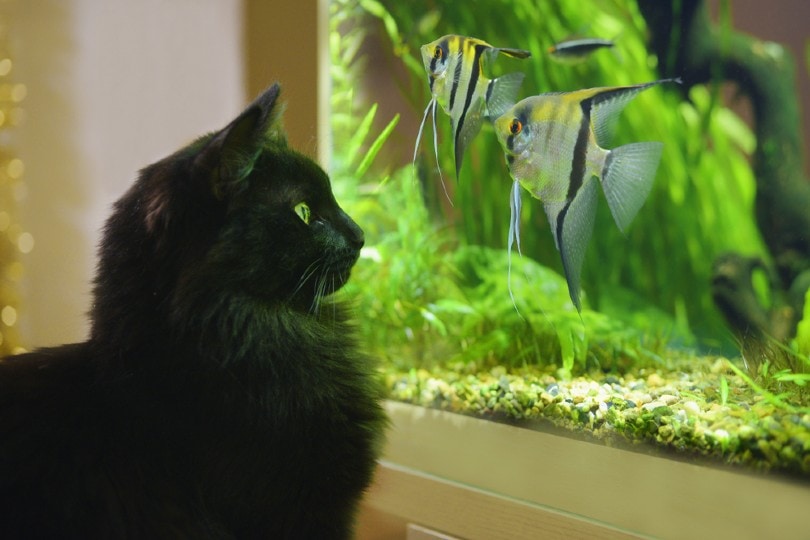What Smells Deter Cats from Peeing? 7 Vet-Approved Options
Updated on
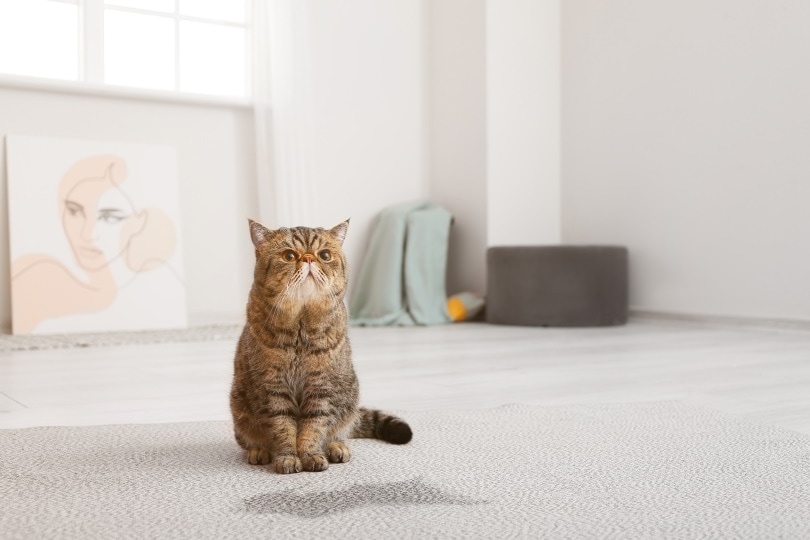
Anyone who has ever owned a difficult cat knows how some cats can be when it comes to peeing around the house. Some cats will spray in the house, while others will pee wherever they feel like it if their litter box isn’t cleaned just right.
It can be frustrating to deal with a cat that doesn’t urinate where they’re supposed to. The good news for you is that there are multiple scents you likely already have in your home that can function as a cat pee deterrent. Read on to learn about the scents that can help deter your cat from peeing in inappropriate places.
Before You Start
It’s important to talk to your cat’s vet and rule out medical causes for your cat’s inappropriate urination. Some cats will do this because they are sick, but others do it solely for behavioral purposes. Once your vet has ruled out illnesses, you can start looking into other options.
One simple way to try to curb your cat’s inappropriate urination is to try out different scents that may deter your cat. Cats that mark tend to repeat mark the same places once their urine smell is there, so for these methods to work, you must first remove the urine smell. Cats have a much better sense of smell than humans, and their urine smell does not go away by just washing with regular soap and water. The most effective method is using an enzymatic cleaner before adding any new smell.
The 7 Smells That Deter Cats From Peeing
1. Coffee

| Efficacy | 3/5 |
| Ease of Use | 3/5 |
Strong scents often discourage cats from urinating in a specific area, making coffee a great option for the job. You can add coffee to the soil of your houseplants to not only discourage your cat from urinating in the area but also to nourish your plants. Make sure to keep it out of reach of your cat, though, as the caffeine in coffee can be dangerous for cats.
Coffee is an affordable, available option for deterring inappropriate urination. Here’s the problem with coffee: caffeine is toxic to cats. So, if you are going to use this method, use only decaffeinated coffee. While this still contains some caffeine, it is present in much smaller quantities than in regular coffee. In addition, you must make sure to place it safely, in a way that your cat is unable to lick it. You must also consider that coffee scent dwindles over time, meaning you’ll need to replace it regularly.
If it’s mixed into the soil of your plants, you’ll need to find other ways to use it in an area since you won’t be able to add new coffee grounds to your plants’ soil every week. Sachets, coffee filters, and other items that allow the scent to escape without spilling coffee grounds everywhere are your best bet. Remember to keep it out of the reach of your cat in the unlikely case its curiosity wins; to keep it safe the cat should not be physically able to lick the coffee off.
2. Citrus

| Efficacy | 4.5/5 |
| Ease of Use | 4/5 |
Probably the most successful urinary deterrent for cats is citrus. The best part about citrus is that it leaves behind a pleasant, fresh smell that brightens your home and can cover any lingering cat urine odors. Citrus peels are often recommended for this purpose, but you can also use citrus-scented urine deterrents made for this purpose.
Citrus-scented plants, like lemon thyme, and lemon balm are also great options. Avoid Lemongrass and lemon verbena as they are toxic to cats. If you’re using citrus peels, make sure to replace the peels every couple of days. Otherwise, the peels will begin to mold and stink, creating a less-than-pleasant odor.
3. Mint
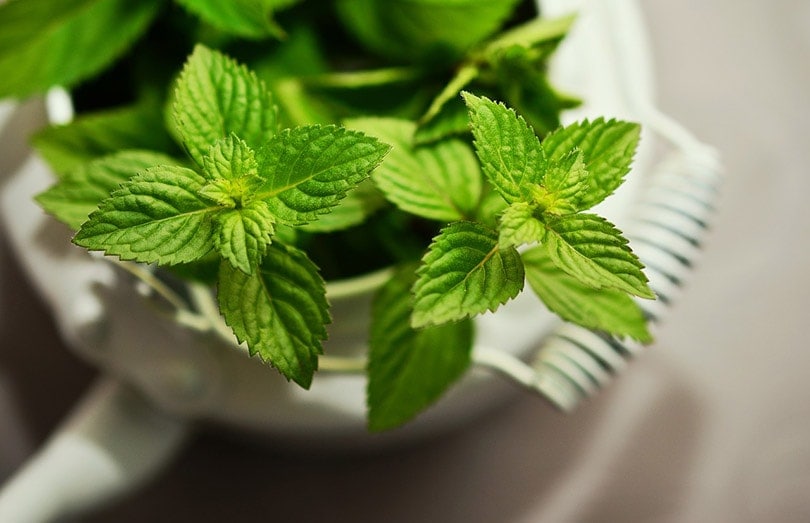
| Efficacy | 4/5 |
| Ease of Use | 4.5/5 |
Mint plants and peppermint-scented items are a pleasant and easy way to prevent inappropriate urination in cats. Although closely related to the catnip plant, mint plants are not as appealing to cats. Small indoor herb gardens are a great way to grow your own mint plants.
If needed in a specific area, you can add potted mint plants or use peppermint-scented sprays to deter your cat. Mint plants are easy to grow and hardy, plus they’re an ideal candidate for indoor hydroponic gardens. However, keep a close eye when you first introduce the plant; you should make sure the cat is deterred by it and avoids the area. The reason is that if cats ingest large amounts of mint plant it will cause vomiting and diarrhea. Avoid the use of mint essential oils as they are toxic to cats.
4. Rosemary
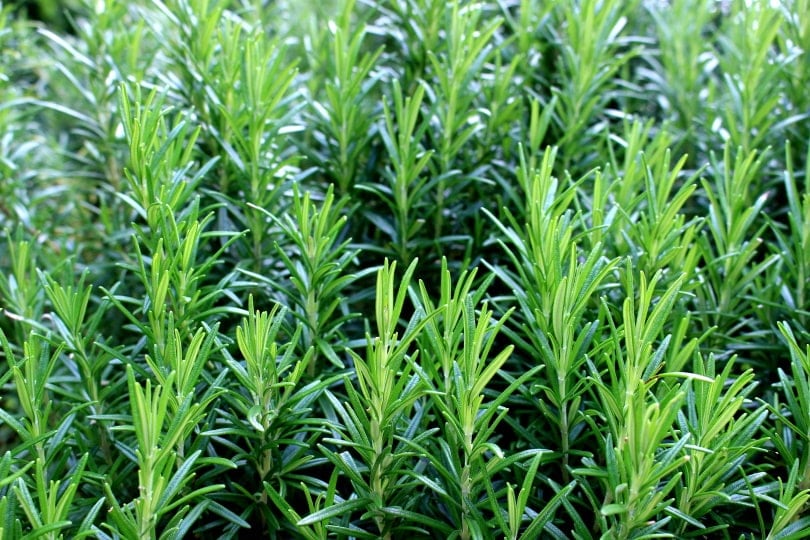
| Efficacy | 3.5/5 |
| Ease of Use | 4/5 |
Rosemary is a fantastic option for deterring inappropriate urination from your cat because it can also function as a fresh seasoning for your food. It produces a strong but delicate herbal scent that is unmistakable.
Try adding potted rosemary plants in the areas where your cat likes to urinate. You can also try adding rosemary leaves or powder into sachets or other breathable items to deter your cat. Some commercial cat-safe cleaning products contain an herbal rosemary scent and may be effective as well.
5. Cinnamon

| Efficacy | 4/5 |
| Ease of Use | 4/5 |
Cinnamon has a distinct, spicy smell that often reminds people of the holiday season. It adds a touch of warmth to a home, and using cinnamon to deter your cat’s inappropriate urination can help cover some of the lingering, unpleasant smell of cat urine.
Cinnamon can be difficult to use indoors, especially in powder form, since it can become messy. Cinnamon sticks or cat-safe cleaning sprays with a cinnamon scent may be your best options. Just make sure your cat does not chew on the cinnamon stick, as it could cause some minor tummy issues.
6. Vinegar
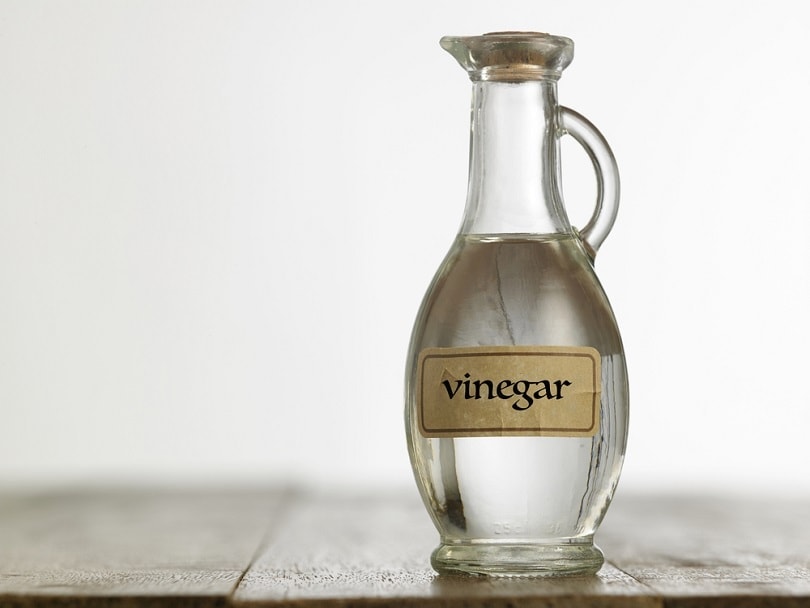
| Efficacy | 3/5 |
| Ease of Use | 4.5/5 |
Vinegar of almost any kind can be used to deter your cat’s urination. It can be diluted in a spray bottle of water and used to clean up pee accidents in your home. Vinegar can help neutralize the odor of the cat urine, preventing your cat from thinking places they’ve peed before are acceptable places to continue peeing.
Now, vinegar doesn’t have the most pleasant scent to people. It can become overwhelming in large quantities, so you may have to find ways to offset the vinegar smell with more pleasant options.
7. Cayenne Pepper

| Efficacy | 4/5 |
| Ease of Use | 2/5 |
Cayenne pepper is one of the more effective options to deter inappropriate urination from cats. Unfortunately, it’s also one of the more difficult options to use. The problem with cayenne pepper is that it typically is found in powder or flake form, both of which can be difficult to contain.
This is a great option for outdoor spaces where you need to deter a cat, like a garden, but when used indoors, it can be difficult to contain in one area. If you sprinkle it in areas where your cat walks around, the cat might lick it off. Cats should definitely not eat chili powder!
Final Thoughts
Preventing your cat’s inappropriate urination habits is unlikely to be an overnight project. Often, you’ll need a combination of things to alter this undesirable behavior in your cat. If you’ve spoken with your cat’s vet and ruled out medical causes for the inappropriate urination, then it’s a good idea to discuss some of these scent options with your vet. They know your cat’s medical history and can give you insight into whether any of these may be inappropriate to use for your cat.
Featured Image Credit: Pixel-Shot, Shutterstock



